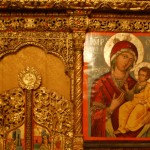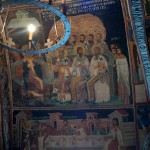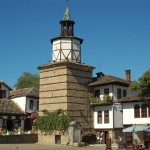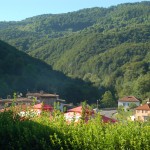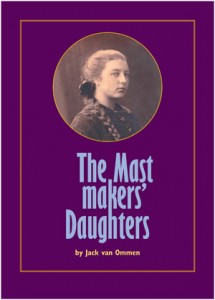It was quite cool in the Stara Planina mountains, eventhough we had descended from the 7,500 feet summit on the Shipka pass to 1,800 feet in the village of Etara. I had not brought any thing but an other t-shirt. A welcome change from the 80 degrees on the coast and the plains and away from the tourist crowds here on the beaches.
Etara has a center for artists who produce traditional handicrafts, wood carving, carpet dying, weaving, etc. I particularly enjoyed, as a Busman’s holiday, the old frame saw mill. Where a log saw was moved up and down like a jig saw, by a very primitive steam system. Our next stop was Tryavna, where with subsidies from the EEC, the village is being restored and the old wood carving trade encouraged. Next we stopped to see the very impressive Tsarevets Fortress in Veliko Tarnovo. It sits on a high hill on the edge of the city. It is like nature dug a giant deep mote around the hill. Because of it’s strategic and easily defendable location it was already used by the Thracians, later by the Romans. The Byzantines built the first real fortress on the hill, between the 5th and the 7th century. The complex used to contain the Royal Palace from where 22 successive kings ruled Bulgaria.
I had many questions for Inga who has studied the Euoropean history thoroughly and loves to go on these discovery trips. My knowledge is in bits and pieces since I never studied the ancient history of Europe. By the time I am done with Turkey and Greece I should have a better picture to work with.
I forgot to mention that we also stopped on Saturday night, before we went up over the Shipka Pass, at Kazanlak to take a look at the Thracian Tomb Museum. This tomb was discovered when constructing a bom shelter in 1944. Built for Thracian ruler in the 4th Century BC. Unfortunately we missed the museum closing time by half an hour. On our way up to the pass we passed several more of these burial mounds rising out of the fields.
On Sunday our next stop was the town of Arbanasi. Nestled between trees, parks and crisscrossed with cobbelstone streets and sand tracks are a number of historic monuments. We chose to visit the Church of the Nativity. Built during the Muslim Ottoman rule in the 16th/17th century.
We made it back to Sozovo before dark. I really enjoyed getting away from my river and sea side routine and observe how the rest of the Bulgarians live and treasure their history.
The weather forecast has niot changed much from last Saturday and it looks like the Three Musketeers here will leave Sozovo for Tsarevo tomorrow.
- Curch of St.Archangel Michael, with Icon museum, Tryavna woodcarving
- 16th/17th century Church of the Nativity evry inch of walls and ceiling covered with biblical scenes and saints
- Tryavna, restored mideival town known for it’s fine wood carving. Note large sandstone roof tiles
- View from hotel in Etara at 1800 feeet elevbation

